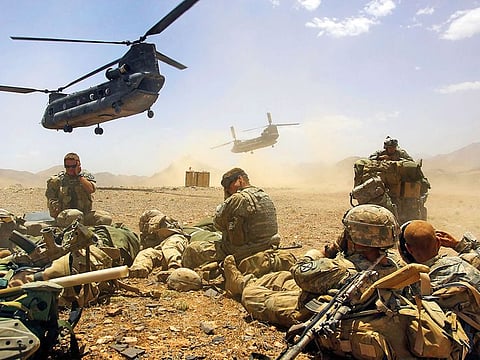Why Trump’s peace deal with Taliban matters
It remains to be seen if the group is able to snap its ties with extremist organisations

In the last year, the US Congress began to claw back its constitutional power to declare war. A possible US truce with the Taliban will show whether the legislative branch is willing to reassert its peacemaking power as well.
The latest example of Congress’s renewed interest in its war-making authority is its 55 to 45 vote in recent weeks in the Senate limiting the president’s ability to attack Iran unless he gets explicit authorisation from Congress. This followed a vote last year to end US military participation in the war in Yemen.
These votes are important correctives to decades of Congress abdicating its war-making power to presidents of both parties. News that the US and the Taliban are close to reaching a truce and a possible agreement for the withdrawal of most US forces from Afghanistan presents an opening for Congress to exert some control over the peace process — which in this case amounts to a dangerous foreign policy.
It may well be that most people are willing to live with an unconditional withdrawal from a war the US has waged for 18 years with little to show for itEli Lake
Step one
The first step is not necessarily asserting the Senate’s right to approve an eventual peace treaty. Rather, it is to gain access to the entire agreement that is now being negotiated between US Special Representative for Afghanistan Reconciliation Zalmay Khalilzad and representatives of the Taliban.
According to Time Magazine, that final agreement will contain several secret annexes. Usually, such appendices are ancillary to the primary agreement. In this case, they are the most important elements.
The article says that one annex will lay out the terms for how US counterterrorism forces can remain in Afghanistan to hold back al Qaeda and other jihadist groups. One, according to the magazine, will contain the Taliban’s “denouncement of terrorism and violent extremism.”
Another annex will contain the mechanism for monitoring how all sides in the war are adhering to the ceasefire while negotiations proceed between the Taliban and the elected Afghan government.
Eventual truce
All of these are vitally important for the eventual truce to be a real peace agreement instead of simply terms of surrender for the Afghan government. The most crucial element, however, will be whether the Taliban itself will commit to severing its long-standing ties to al Qaeda.
Recent evidence suggests that it is not ready. In September, for example, US and Afghan forces reportedly killed a senior al Qaeda member during a raid in Taliban-controlled Helmand Province. Last month, Long War Journal reported that the Pentagon spiked a press release announcing the death because “it would complicate future negotiations with the Taliban.”
“You can’t pretend the Taliban is willing to break with al Qaeda when they are still deeply in bed with one another,” says Tom Joscelyn, a senior fellow at the Foundation for Defence of Democracies and senior editor of the Long War Journal. His point raises a larger question: If the provisions of the agreement that require the Taliban to break with terrorism are not public, then how much are they really worth?
Here is where Congress can reclaim its oversight function. At the very least, representatives and senators can give an honest assessment of any truce with the Taliban.
It may well be that most people are willing to live with an unconditional withdrawal from a war the US has waged for 18 years with little to show for it. If that is the case, however, then Congress should say so. Surrender camouflaged as peace is little more than an ignoble lie.
The US sign a deal with the Taliban on February 29, building on an agreement on reducing violence across Afghanistan, Secretary of State Mike Pompeo said Friday. "Upon a successful implementation of this understanding, signing of the US-Taliban agreement is expected to move forward," he said in a statement (AFP)
Bloomberg L.P.
Eli Lake is a columnist who specialises in national security and foreign policy


